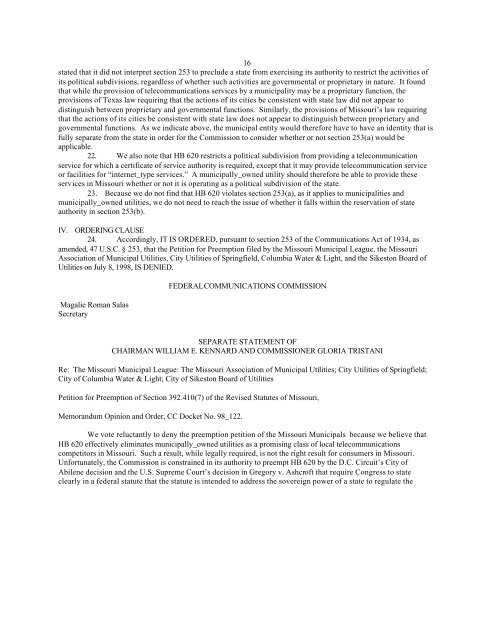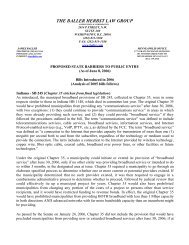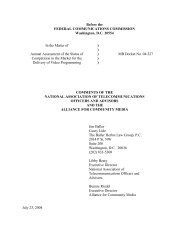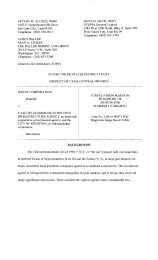Petition for Writ of Certiorari
Petition for Writ of Certiorari
Petition for Writ of Certiorari
You also want an ePaper? Increase the reach of your titles
YUMPU automatically turns print PDFs into web optimized ePapers that Google loves.
16<br />
stated that it did not interpret section 253 to preclude a state from exercising its authority to restrict the activities <strong>of</strong><br />
its political subdivisions, regardless <strong>of</strong> whether such activities are governmental or proprietary in nature. It found<br />
that while the provision <strong>of</strong> telecommunications services by a municipality may be a proprietary function, the<br />
provisions <strong>of</strong> Texas law requiring that the actions <strong>of</strong> its cities be consistent with state law did not appear to<br />
distinguish between proprietary and governmental functions. Similarly, the provisions <strong>of</strong> Missouri’s law requiring<br />
that the actions <strong>of</strong> its cities be consistent with state law does not appear to distinguish between proprietary and<br />
governmental functions. As we indicate above, the municipal entity would there<strong>for</strong>e have to have an identity that is<br />
fully separate from the state in order <strong>for</strong> the Commission to consider whether or not section 253(a) would be<br />
applicable.<br />
22. We also note that HB 620 restricts a political subdivision from providing a telecommunication<br />
service <strong>for</strong> which a certificate <strong>of</strong> service authority is required, except that it may provide telecommunication service<br />
or facilities <strong>for</strong> “internet_type services.” A municipally_owned utility should there<strong>for</strong>e be able to provide these<br />
services in Missouri whether or not it is operating as a political subdivision <strong>of</strong> the state.<br />
23. Because we do not find that HB 620 violates section 253(a), as it applies to municipalities and<br />
municipally_owned utilities, we do not need to reach the issue <strong>of</strong> whether it falls within the reservation <strong>of</strong> state<br />
authority in section 253(b).<br />
IV. ORDERING CLAUSE<br />
24. Accordingly, IT IS ORDERED, pursuant to section 253 <strong>of</strong> the Communications Act <strong>of</strong> 1934, as<br />
amended, 47 U.S.C. § 253, that the <strong>Petition</strong> <strong>for</strong> Preemption filed by the Missouri Municipal League, the Missouri<br />
Association <strong>of</strong> Municipal Utilities, City Utilities <strong>of</strong> Springfield, Columbia Water & Light, and the Sikeston Board <strong>of</strong><br />
Utilities on July 8, 1998, IS DENIED.<br />
Magalie Roman Salas<br />
Secretary<br />
FEDERAL COMMUNICATIONS COMMISSION<br />
SEPARATE STATEMENT OF<br />
CHAIRMAN WILLIAM E. KENNARD AND COMMISSIONER GLORIA TRISTANI<br />
Re: The Missouri Municipal League: The Missouri Association <strong>of</strong> Municipal Utilities; City Utilities <strong>of</strong> Springfield;<br />
City <strong>of</strong> Columbia Water & Light; City <strong>of</strong> Sikeston Board <strong>of</strong> Utilities<br />
<strong>Petition</strong> <strong>for</strong> Preemption <strong>of</strong> Section 392.410(7) <strong>of</strong> the Revised Statutes <strong>of</strong> Missouri,<br />
Memorandum Opinion and Order, CC Docket No. 98_122.<br />
We vote reluctantly to deny the preemption petition <strong>of</strong> the Missouri Municipals because we believe that<br />
HB 620 effectively eliminates municipally_owned utilities as a promising class <strong>of</strong> local telecommunications<br />
competitors in Missouri. Such a result, while legally required, is not the right result <strong>for</strong> consumers in Missouri.<br />
Un<strong>for</strong>tunately, the Commission is constrained in its authority to preempt HB 620 by the D.C. Circuit’s City <strong>of</strong><br />
Abilene decision and the U.S. Supreme Court’s decision in Gregory v. Ashcr<strong>of</strong>t that require Congress to state<br />
clearly in a federal statute that the statute is intended to address the sovereign power <strong>of</strong> a state to regulate the






